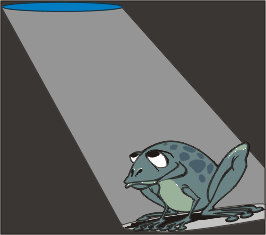| This Lesson will cover:
- A Critical Approach
- Items Included in a Final
Summation
- Cumulative Research Strategy

Sometimes, we just get stuck. We
cannot seem to go anywhere and it gets discouraging. A large group
of frogs were on a trip. They weren't really friends or
acquaintances but for some reason they found themselves on the same
path through the woods. As it happened, two of the frogs fell into a
deep pit. Anxiously all the other frogs gathered around and peered
into the pit. When they saw how deep the pit was, they instantly
knew that the two frogs were as good as dead. A couple of negative
frogs even told them so.
The two frogs in the pit ignored the comments and tried to jump
up out of the pit with all of their might.
More of the other frogs started telling them to stop, that they were
as good as dead.
Finally, one of the frogs gave in and took heed and basically
quit trying, hoping maybe to wait for some type of miraculous help.
Unfortunately, with no inner strength he fell down and died.
The other frog continued to jump as hard as he could. The crowd
of frogs continued to yell at him to stop the pain and just die. He
jumped even harder and miraculously he finally made it out. When he
got out, the other amazed frogs got right in his face and asked,
"Did you not hear us?" The frog explained to them that he
was, in fact, deaf, and he thanked them for encouraging him the
entire time.
You may think this is strange, that I talk about encouragement on
one hand and then "A Critical Approach" on the other.
Actually, this isn�t about other people giving you criticism, but
about criticism of previous research. It doesn�t have to be
discouraging. On the contrary, it can be very enlightening,
humbling, and full of rich experiences.
A CRITICAL APPROACH
As discussed in Chapter Seven, the
individual or generation where you hit a brick wall should have
the most documentation. It is here where the last phase of research
left off and a new phase will begin. You don�t want to duplicate
research at this juncture. This should be your summary statement,
the conclusion to this chapter in your life, as though you might
not ever return here again. You don�t want others to assume something
that you are not saying.
What were the thirteen items you should
include in your final summation?
|